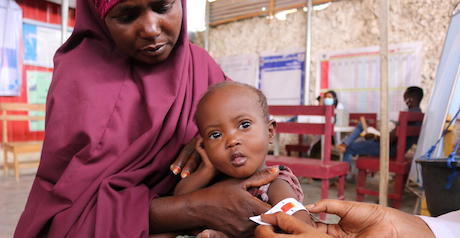The malnutrition crisis in Somalia — fueled by severe drought — keeps getting worse, UNICEF reported Tuesday.
Tens of thousands of children in the Horn of Africa country are now being admitted for treatment for severe acute malnutrition every month, at a rate of one child every minute.
On a mission to Mogadishu this week, UNICEF spokesperson James Elder said that the current situation appears even worse than in 2011, when famine last struck Somalia, killing over 250,000 people.
“Without greater action and investment, we are facing the death of children on a scale not seen in half a century,” Elder said.
Often, it is not starvation that claims young lives but disease. Severely malnourished children, their immune systems significantly weakened, are up to 11 times more likely to die of treatable diseases like diarrhea and measles than well-nourished children. Health risks are further heightened among children living close together in displacement camps where sanitation and hygiene are lacking.
UNICEF has been on the ground responding to the crisis by trucking in safe water and working with partners to find and treat severely malnourished children with Ready-to-Use Therapeutic Food (RUTF).
Mobile teams have been deployed to deliver services to children in hard-to-access locations. More than 300,000 children with severe acute malnutrition have been treated so far this year, while the emergency water trucking effort has reached 500,000 people in just the last three months, Elder reported.
Despite recent substantial pledges by donor agencies and governments, more funding is needed to help UNICEF expand and sustain these and other emergency response operations.
“We need funding to provide immediate lifesaving support to the millions of people who have been displaced and the millions of children who will likely die if they don’t receive treatment for malnutrition,” UNICEF Somalia Communications Chief Victor Chinyama said in an Oct. 17 interview with BBC World News. “But this is a crisis connected to climate change, so while we address the immediate impact of the drought, we also need to look at long-term solutions for people in Somalia to adapt to [those] realities.”
UNICEF’s three-year appeal to help families and their communities build resilience in the Horn of Africa region is currently just 3 percent funded.
Help UNICEF reach more malnourished children in need in Somalia and other countries in the Horn of Africa. Your contribution can help make a difference. Donate today.
Top photo: On Oct. 4, 2022, a health worker screens 2-year-old Sabirin for malnutrition at a UNICEF-supported health center outside Mogadishu, Somalia. © UNICEF/UN0719737/Yusuf
